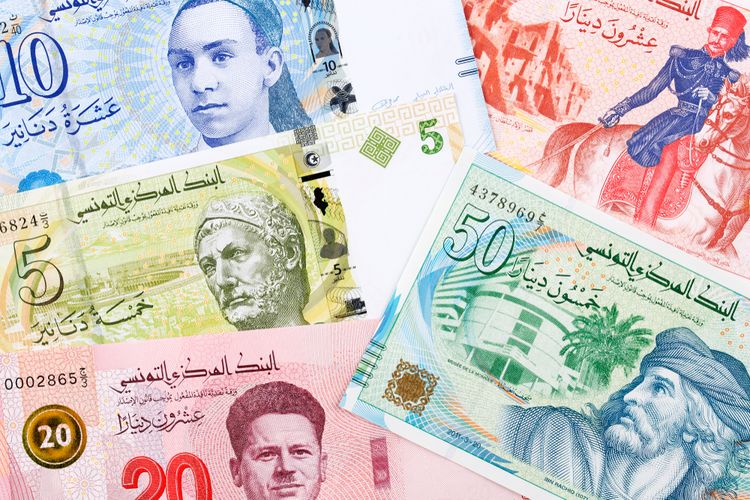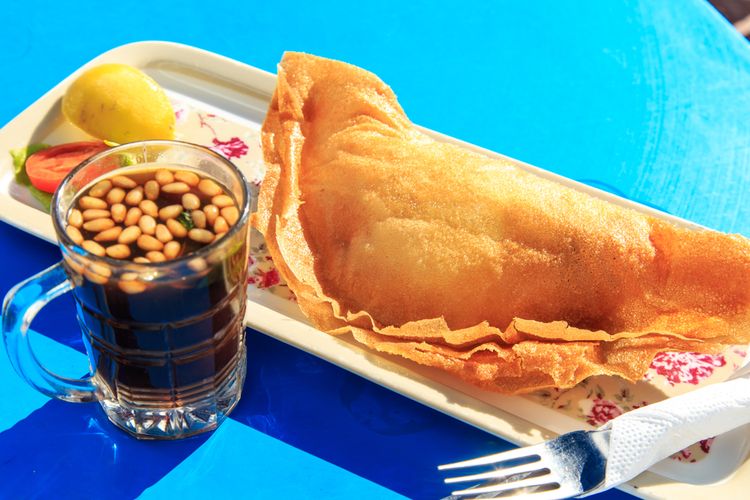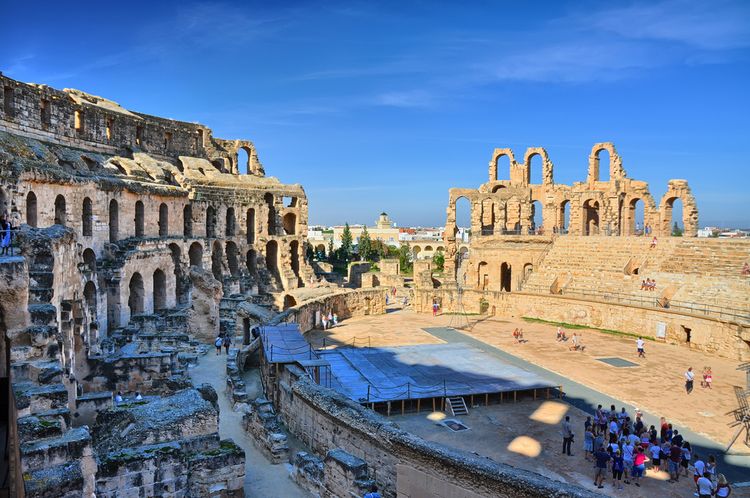Tunisia Travel Tips and Information
Official Name
Republic of Tunisia
Capital
Tunis
Population
Country Code
Approximately 12.3 million people
TN
Country Code (international calls)
+216
The flight time to Tunisia is approximately 12 hours. Check the climate, currency, religion, manners, other information of Tunisia below. Wishing you pleasant travels to Tunisia.
Tunisia is a republic located along the North African coast, roughly in the middle. It borders Algeria and Libya, with the Mediterranean Sea to the northeast. Across the sea lies the Italian island of Sicily.
Local Climate / Weather
Tunisia enjoys a Mediterranean climate in the north and a desert climate in the south. The north experiences mild, rainy winters and hot, dry summers, while the southern regions, close to the Sahara, are much warmer year-round. Temperatures can vary greatly depending on the season and location, making it crucial for travelers to choose the best time based on their preferences. Winter (December to February): Cool and wet, particularly in northern Tunisia, with average temperatures around 10-15°C (50-59°F). Spring (March to May): Pleasant and warm, with blooming landscapes ideal for sightseeing. Summer (June to August): Hot, especially in inland and southern areas, where temperatures often reach above 30°C (86°F). Autumn (September to November): Mild and comfortable, with occasional rain, making it one of the best seasons to visit.
Currency & Tipping
Currency
The official currency in Tunisia is the Tunisian Dinar (TND), often represented by the symbol "DT." It’s important to note that the Tunisian Dinar is a closed currency, meaning it can’t be bought or sold outside the country, so visitors should plan to exchange money upon arrival. The Tunisian Dinar is divided into smaller units called millimes, with 1 Dinar equal to 1,000 millimes. Travelers will encounter: Banknotes: Commonly available in denominations of 5, 10, 20, and 50 Dinars Coins: 1, 2, and 5 Dinars, as well as smaller coins in millimes (10, 20, 50, 100, 200 millimes)
Tipping
Tipping is not mandatory in Tunisia but is appreciated for good service. Here are some general guidelines: Restaurants: A 5-10% tip is customary if a service charge isn’t included in the bill. Hotels: Tip porters around 1-2 Dinars per bag and housekeeping staff a few Dinars per day for extended stays. Taxis: Rounding up the fare or adding a small tip is appreciated, though not required. Tour Guides and Drivers: For organized tours, consider tipping 10-15 Dinars per person for guides and a smaller amount for drivers.
Useful Travel Information

Voltage & Electrical Outlets
Tunisia operates on a 220V supply voltage with a frequency of 50Hz. The power sockets commonly use Type C and Type E plugs (the standard European round two-prong plugs). Travelers from countries with different voltage standards or plug types may need a voltage converter and an adapter to charge devices. It's advisable to pack these items before arriving in Tunisia.

Internet Connectivity
Tunisia offers a relatively good internet infrastructure in urban areas, with Wi-Fi widely available in hotels, cafes, and some public areas. Major cities and tourist destinations generally have reliable internet connections, though remote areas may have limited access. For travelers needing constant connectivity, SIM cards with data plans are available from local providers like Tunisie Telecom, Ooredoo, and Orange. It’s easy to find prepaid SIM cards at airports and retail shops, making it convenient to stay connected during your trip.
Water for Consumption (Drinking Water)
Tap water in Tunisia is generally safe to use for brushing teeth and bathing in major cities, but it’s recommended to drink bottled water, especially for tourists unaccustomed to the local water. Bottled water is readily available in shops, hotels, and restaurants across the country, and it’s wise to carry a bottle when sightseeing, especially during the hot summer months.
Culture, Religion & Social Etiquette
Culture
Tunisia’s culture reflects a unique blend of Arab, Mediterranean, and French influences, with a rich history visible in its art, music, and architecture.
Religion
The predominant religion in Tunisia is Islam, and many cultural customs are influenced by Islamic traditions.
Social Etiquette
Travelers should be mindful of conservative dress in religious or rural areas, though more relaxed attire is generally accepted in tourist zones and beaches. Respect for religious practices is important, especially during Ramadan, when many Tunisians fast during daylight hours. When greeting, it’s customary to use a handshake or a slight bow—hugging or close physical contact is generally reserved for close friends or family. Being polite, modest, and respectful of local customs will go a long way in enjoying Tunisia’s warm hospitality.
Food Culture
Tunisian cuisine offers a flavorful journey for travelers, blending Mediterranean, Arabic, and French influences with a distinct North African twist. Staple dishes include couscous served with spiced meats or vegetables, and brik, a crispy pastry filled with egg, tuna, or potato. Street food is also popular, with lablabi (a chickpea soup topped with bread and spices) and makroud (a semolina pastry with dates or figs) being must-try options. Many visitors enjoy trying these at local markets, such as in Tunis or Sousse, where flavors are vibrant and portions generous. For those looking for authentic dining experiences, popular spots like Dar El Jeld in Tunis for traditional fare or El Ali in the Medina of Tunis offer cozy settings and authentic flavors. Exploring Tunisia’s food culture will offer you a warm and delicious taste of local life and traditions.
Major Tourist Attractions & UNESCO World Heritage Sites
Major Tourist Attractions
Tunisia is home to diverse tourist destinations that offer travelers a rich blend of history, natural beauty, and vibrant culture. The capital, Tunis, is a must-visit, with its bustling Medina, colorful markets, and the modern Habib Bourguiba Avenue. Nearby, Sidi Bou Said enchants visitors with its blue-and-white buildings overlooking the Mediterranean, perfect for scenic photos and seaside cafes. Hammamet and Djerba are famous for their sandy beaches, ideal for relaxation or water sports. In the south, Douz offers access to the Sahara Desert, where travelers can embark on camel treks, explore salt flats, and experience desert life. For visitors looking for a mix of urban excitement, beach relaxation, and desert adventure, Tunisia has something to satisfy every travel interest.
UNESCO World Heritage Sites
Tunisia boasts several UNESCO World Heritage Sites that highlight its ancient and cultural heritage. The ruins of Carthage, located near Tunis, allow visitors to explore remnants of the once-powerful Phoenician civilization, including ancient baths, temples, and theaters. El Jem Amphitheater, one of the largest Roman amphitheaters in the world, offers a fascinating glimpse into Tunisia’s Roman past and is a popular photo spot. In Kairouan, the Great Mosque of Kairouan stands as one of the oldest and most significant Islamic sites in North Africa, celebrated for its stunning architecture. Lastly, the Medina of Tunis is a maze of vibrant alleys with historic mosques, palaces, and traditional souks, offering an immersive experience in Tunisia’s rich cultural legacy. Each of these sites provides a unique window into Tunisia’s diverse history and is well worth a visit.
Travel FAQs
What is the most popular airport to fly into Tunisia?
The airport in the capital, Tunis, Tunis-Carthage International Airport is popular.
Is English spoken in Tunisia?
Although it is a French-speaking country, English is not widely spoken. You need to be careful when sightseeing.
What is the security situation in Tunisia? Is there anything I should be careful of?
Although the security situation is relatively stable compared to other parts of the African continent, it is best to avoid traveling alone when sightseeing. There are some areas in the country where travel is advised to be avoided.
What is the best season to visit Tunisia?
The best season to travel to Tunisia is from October to November or from February to March.




